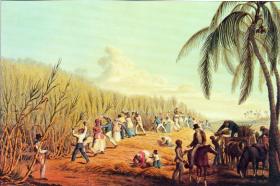Eighteenth-Century Ireland Conference
Published in Issue 5 (Sep/Oct 2007), News, Uncategorized, Volume 15
Slaves cutting sugar cane on Antigua, 1823. One theme of the conference was the 200th anniversary of the abolition of the slave trade in the British Empire. (British Library)
The annual Eighteenth-Century Ireland Conference, convened by Moyra Maslett and hosted by the interdisciplinary Centre for Eighteenth-Century Studies at Queen’s University, Belfast, included over 30 papers from speakers from Ireland and abroad. This year’s conference was notable not only for the usual wealth and diversity of papers but also for the focus on two commemorative subjects, the 300th anniversary of the Anglo-Scottish Union (1707) and the 200th anniversary of the abolition of the British slave trade (1807). Special attention was also given to the Irish poet Thomas Moore and the current research projects relating to his career and works, with a presentation from the Thomas Moore Hypermedia Archive project at NUI Galway and an exhibition highlighting the significance of the Moore collection at Queen’s, Belfast.
Ian Campbell Ross opened the conference proceedings with a lively and insightful re-reading of the works of Sir Paul Rycaut (1621–1700), a British author and diplomat renowned for his writings on the Ottoman Empire and his translations of Garcilaso de la Vega’s classic history of the Incas, highlighting Irish literary influences in his work. The inaugural Alan Harrison Memorial Lecture was an equally stimulating talk, delivered by Angela Bourke, which reassessed the place of Eibhlín Dubh Ní Chonaill’s Lament for Art Ó Laoghaire as an oral source for Irish history by situating it within a rich and spontaneous tradition of Gaelic composition that existed beyond the written word.
The special topics of the conference were discussed in two sessions, with notable papers from Eoin Magennis on the economic discourses of the 1707 union and from Aileen Douglas on the parallels between slaves, Irish tenants and the working class in Maria Edgeworth’s writings. Political history was well represented by papers from Lisa-Marie Griffith on Charles Lucas and his relations with Dublin’s lord mayor in the early 1770s, and from Ultán Gillen on the connections between religion and counter-revolution from 1789 to 1803. Patrick Walsh’s paper on the prosecution of William Conolly for fraud, perjury and body-snatching and Martyn Powell’s contribution on houghing (cutting the tendons at the back of the leg) brought more colourful (read: gruesome) aspects of eighteenth-century history to life.
Sessions on letters and diaries and on cultures of print, image and spectacle raised many aspects of eighteenth-century social history. Willemijn Ruberg discussed gender and the appearance of emotion in the memoirs and diaries surviving from the period of the United Irish rebellion, Michael O’Connor highlighted the career of printer James Magee in Belfast, and Stephen O’Connor analysed the consumption of Benjamin West’s painting Death of Wolfe on printed transfer pottery in Ireland. Prose and poetry papers were also presented on the work of Percy, Orr, Farqhuar, Swift, Sheridan, Burke and Moore. Graham Gargett reassessed the early career of Oliver Goldsmith in 1750s London through textual analysis of his reviews of French-language material for the Monthly Review, and Christina Morin discussed the place of Edgeworth’s Castle Rackrent within the genre of the Irish national tale. Irish-language papers also featured, on Gaelic scholars and writers of the period such as Thaddaeus Connellan, Micheál Coimín and Muiris Ó Gormáin.
Returning to one of the special themes of the conference, and a subject that should be well appreciated by History Ireland readers (HI 15.3, May/June 2007), the proceedings closed with a talk by Nini Rodgers, author of Ireland, slavery and anti-slavery 1612–1865, on Olaudah Equiano, whose autobiography describing the horrors of slavery is credited with helping to influence the abolition of the slave trade in 1807.
















